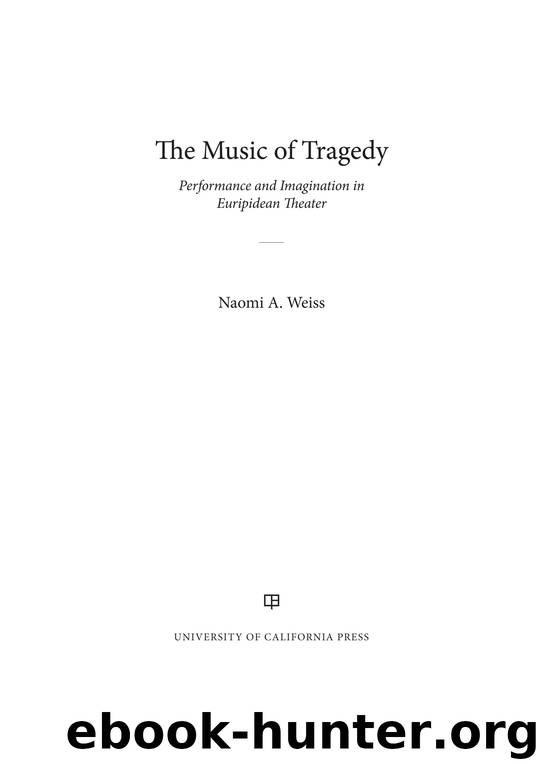The Music of Tragedy: Performance and Imagination in Euripidean Theater by Naomi A. Weiss

Author:Naomi A. Weiss [Weiss, Naomi A.]
Language: eng
Format: epub
Tags: Literary Criticism, Ancient & Classical, Music, History & Criticism, History, Ancient, Greece, Poetry
ISBN: 9780520968493
Google: egZADwAAQBAJ
Amazon: B0784WLJKL
Publisher: Univ of California Press
Published: 2017-12-15T00:00:00+00:00
TRAVEL AND EPIPHANY
The chorus perform the third stasimon within just a hundred lines of the second, as Menelaus and Helen depart on the ship that Theoclymenus has unwittingly provided. In this final burst of song and dance, they imagine the return of Helen to Sparta, wishing that they could travel there themselves, rather as the chorus of Iphigenia in Tauris sing of the escape of Iphigenia, Orestes, and Pylades to Athens.152 This focus on the immediate present and future of the play makes the ode seem a far cry from the lament that dominated the parodos and first stasimon and from the narrative aetiology of the song that they have just sung. At the same time, however, there is a sense of continuity between the third stasimon and the chorus’s previous songs. Not only is the aeolo-choriambic meter of this ode similar to that of the previous one, but as we shall see, it develops some of the imagery of Dionysiac cultic celebration that appeared in the second stasimon, displaying the different kind of mousikē to which that song propelled us. Moreover, like the previous stasima, this one is dominated by images of choreia, which continue to articulate the relationship between Helen and the chorus, and so also Helen’s position at this point in the dramatic narrative. As in the first stasimon, in which the chorus represented the mourning being performed by Helen offstage, here, through their highly choreographic description of Helen’s travel, they enact the journey being made beyond the space of the dramatic action.153 They then look beyond the play’s temporal scope, imagining and simultaneously representing through their own performance Helen’s participation in choreia back in Sparta. In doing so, the chorus seem to bring her back into the play, transcending the distance between Egypt and Greece by conjuring up her presence amid their choral song and dance just as they did previously by summoning her as the nightingale. But whereas in the first stasimon they did succeed in bringing Helen back onstage, here their choreia heralds the arrival of the Dioskouroi instead, thus bringing the play to a close.
Like the parodos and first stasimon, the ode begins with an arresting invocation, this time to the Sidonian ship carrying Helen to Greece, which, like the Sirens, nightingale, and Great Mother, functions in large part as a figure of musicality:154
Φοίνισσα Σιδωνιὰς ὦ
Download
This site does not store any files on its server. We only index and link to content provided by other sites. Please contact the content providers to delete copyright contents if any and email us, we'll remove relevant links or contents immediately.
| Ancient & Classical | Arthurian Romance |
| Beat Generation | Feminist |
| Gothic & Romantic | LGBT |
| Medieval | Modern |
| Modernism | Postmodernism |
| Renaissance | Shakespeare |
| Surrealism | Victorian |
4 3 2 1: A Novel by Paul Auster(12375)
The handmaid's tale by Margaret Atwood(7757)
Giovanni's Room by James Baldwin(7330)
Asking the Right Questions: A Guide to Critical Thinking by M. Neil Browne & Stuart M. Keeley(5759)
Big Magic: Creative Living Beyond Fear by Elizabeth Gilbert(5756)
Ego Is the Enemy by Ryan Holiday(5414)
The Body: A Guide for Occupants by Bill Bryson(5082)
On Writing A Memoir of the Craft by Stephen King(4935)
Ken Follett - World without end by Ken Follett(4723)
Adulting by Kelly Williams Brown(4566)
Bluets by Maggie Nelson(4548)
Eat That Frog! by Brian Tracy(4526)
Guilty Pleasures by Laurell K Hamilton(4439)
The Poetry of Pablo Neruda by Pablo Neruda(4097)
Alive: The Story of the Andes Survivors by Piers Paul Read(4020)
White Noise - A Novel by Don DeLillo(4004)
Fingerprints of the Gods by Graham Hancock(3996)
The Book of Joy by Dalai Lama(3976)
The Bookshop by Penelope Fitzgerald(3844)
